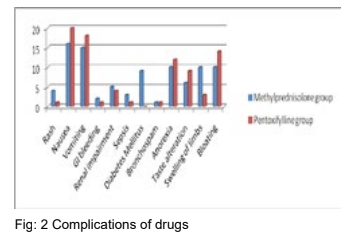Abstract
Introduction: Severe Alcoholic hepatitis (AH) is an acute form
of alcohol induced liver injury. Often it present as fetal diseases
with very high (30-50%) short term (28 days) mortality. This study
was conducted from period May 2016 to July 2017 in Liver unit,
Bir hospital. The main objective was to find out 28 days mortality
in patients with severe alcoholic hepatitis who had Discriminant
function (DF) ≥ 32. This was a prospective, comparative, randomized
interventional hospital based study.
Methodology: Hundred and ten diagnosed patients of severe
alcoholic hepatitis who fulfilled the criteria were enrolled and
randomized into two groups (odd number and even number). Group
1 received methylprednisolone and group 2 received pentoxifylline
for 28 days. In both groups N acetylcysteine were added. Lille score
was calculated in methylprednisolone group at day 7 and patients
with score of ≤ 0.45 were continued methylprednisolone for total
28 days otherwise stopped. Data were recollected at day 28. They
were compared in relation to survival, complications of drugs and
causes of mortality.
Results: Mean age of presentation were 40.21±10.5 yrs in
methylprednisolone and 42.1±12.1 yrs in pentoxifylline group.
In both groups complications were nausea, vomiting, bloating,
anorexia and swelling of limb. However, hyperglycemia (16.4%) and
renal impairment (9.1%) were more common in methylprednisolone
group. Mortality rates were 34.5% in methylprednisolone and 37.8%
in pentoxifylline group within 28 days. Common causes of death in
both groups were hepatic encephalopathy, hepatorenal syndrome,
sepsis or the cause was undetermined.
Conclusion: Alcoholic hepatitis is common manifestation of
alcoholic liver disease with high short term mortality in both the
groups however adverse effects of drugs are more common in
methylprednisolone groups.
References
Morgan TR, Nagy L. Standard definitions and common data elements for clinical trials in patients with alcoholic
hepatitis: recommendation from the NIAAA Alcoholic Hepatitis Consortia. Gastroenterology. 2016 Apr 1;150(4):785-90.
2. Sandahl TD, Jepsen P, Thomsen KL, et al. Incidence and mortality of alcoholic hepatitis in Denmark 1999-2008: a
nationwide population based cohort study. J Hepatol 2011;54:760–764.
3. Forrest EH, Evans CD, Stewart S, et al. Analysis of factors predictive of mortality in alcoholic hepatitis and
derivation and validation of the Glasgow alcoholic hepatitis score. Gut 2005; 54:1174–1179.
4. Nguyen-Khac E, Thevenot T, Piquet MA, et al. Glucocorticoids plus N-acetylcysteine in severe alcoholic hepatitis.
N Engl J Med 2011;365:1781–9.
5. Rahimi E, Pan JJ. Prognostic models for alcoholic hepatitis. Biomarker research. 2015 Dec;3(1):20.
6. Simon D, Galambos JT. A randomized controlled study of peripheral parenteral nutrition in moderate and severe
alcoholic hepatitis. J Hepatol 1988; 7:200.
7. Cabré E, et al. Short- and long-term outcome of severe alcohol-induced hepatitis treated with steroids or enteral
nutrition: a multicenter randomized trial. Hepatology. 2000; 32:36–42.
8. Thursz MR, Richardson P, Allison M, Austin A, Bowers M, Day CP, et al. Prednisolone or pentoxifylline for alcoholic
hepatitis. N Engl J Med 2015;372:1619–1628.
9. Singh S, Murad MH, Chandar AK, Bongiorno CM, Singal AK, Atkinson SR, et al. Comparative effectiveness of
pharmacological interventions for severe alcoholic hepatitis: a systematic review and network metaanalysis.
Gastroenterology 2015;149:958–970, e912.
10. Mathurin P, Abdelnour M, Ramond MJ, et al. Early change in bilirubin levels is an important prognostic factor in
severe alcoholic hepatitis treated with prednisolone. Hepatology 2003;38:1363–9.
11. Gholam PM . Prognosis and prognostic scoring models for alcoholic liver disease and acute alcoholic hepatitis .
Clin Liver Dis 2016 ; 20 : 491 – 7.
12. Dunn W , Jamil LH , Brown LS et al. MELD accurately predicts mortality in patients with alcoholic hepatitis .
Hepatology 2005 ; 41 : 353 – 8.
13. Louvet A , Naveau S , Abdelnour M et al. Th e Lille model: a new tool for therapeutic strategy in patients with
severe alcoholic hepatitis treated with steroids . Hepatology 2007 ; 45 : 1348 – 54.
14. Mookerjee RP, Malaki M, Davies NA, Hodges SJ, Dalton RN, Turner C, et al. Increasing dimethylarginine levels are
associated with adverse clinical outcome in severe alcoholic hepatitis. Hepatology 2007;45:62-71.
15. Carithers RL, Herlong HF, Diehl AM, Shaw EW, Combes B, Fallon HJ, Maddrey WC. Methylprednisolone therapy
in patients with severe alcoholic hepatitis: a randomized multicenter trial. Annals of internal medicine. 1989 May
1;110(9):685-90.

